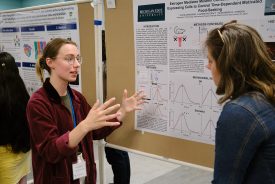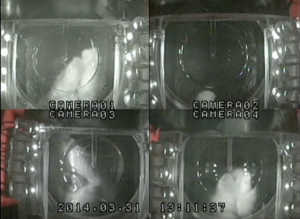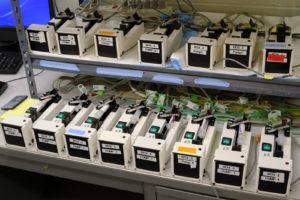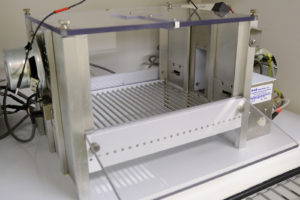About Our Lab
Our lab studies the neuronal basis of learning and memory. We are located in the Interdisciplinary Science and Technology Building (ISTB) at Michigan State University on the East Lansing Campus. We use an interdisciplinary approach combining cutting-edge neuroscience techniques together with sophisticated analyses of behavior in rodents. These studies offer novel insights into facets of ingestive behavior, neuropsychiatric illness and addiction.
Research Focuses
-
Examining the neurobiological and psychological mechanisms that influence the learned control of ingestive behavior
-
Exploring the behavioral mechanisms underlying learning and motivation
-
Using animal models to explore the psychobiological processes underlying mental illness and mood disorders
-
Chemogenetic and optogenetic manipulations assess the role of dopamine in learning and decision-making
Main Players
The Johnson Lab crew:
-

Alex W. Johnson, PhD
PI
-

Victoria J. Kaufman
Lab Manager
-

Bing Mo
PhD Student
Techniques
The Johnson lab uses a number of cutting-edge techniques to manipulate cells of interest with a high degree of spatial and temporal resolution. This is achieved through transgenic and viral-mediated approaches, to allow for chemogenetic and optogenetic interrogation of discrete circuits within the central nervous system. We additionally use a variety of labelling tools to identify circuits of interest. A core focus of the lab also includes close inspection of behavioral mechanisms via the implementation of conditioning preparations (Pavlovian, instrumental) to examine the contents of learning and the decisions to engage in reward and ingestive behaviors.
Video: Optogenetic stimulation studies
Reinstatement of conditioned approach behavior induced by VTA dopamine stimulation. TH-Cre mice are injected with a Cre-dependent channelrhodopsin and subsequently trained to acquire food during presentations of a CS+. Following extinction of the CS+, the capacity for VTA dopamine stimulation alone to invigorate conditioned approach was examined. Stimulation of dopamine cells in this manner reinstated conditioned approach behavior.
What We're Up To
-
 09Jun
09JunAWJ Lab at MISfN 2023
Johnson Lab undergrads represent MSU on home turf at this year's Michigan
Read More -
 07Jun
07JunLauren’s Defense and PhD; Congrats and Best of Luck!
Congratulations, Lauren! Lauren Raycraft has successfully defended her
Read More -
 14Apr
14AprAWJ Lab at UURAF 2023
Our undergrads bring their best brains to UURAF Toria Fex received first
Read More -
 02Apr
02AprMSU Scifest Expo
The Johnson Lab provides demonstrations palatable to all ages! Nathan
Read More



